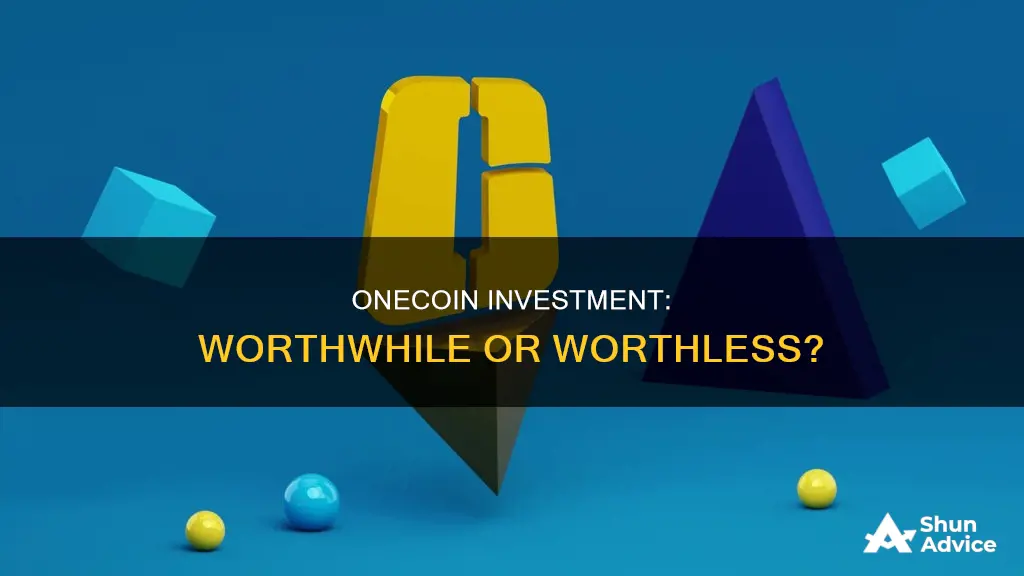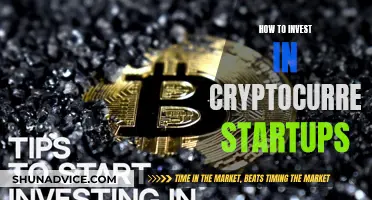
OneCoin is a fraudulent cryptocurrency scheme run by offshore companies OneCoin Ltd and OneLife Network Ltd, both founded by Ruja Ignatova and Sebastian Greenwood. OneCoin is considered a Ponzi scheme due to its structure of paying early investors with money obtained from newer ones. It is also a pyramid scheme, as it recruited investors without providing any actual product. The company claimed to sell educational material for cryptocurrency trading, but these packages were barely mentioned in recruiting meetings and much of their content was plagiarized. OneCoin has been described as one of the biggest scams in history and has been the subject of legal issues and criticism worldwide. With ongoing legal proceedings and a fugitive founder, is OneCoin a good investment?
| Characteristics | Values |
|---|---|
| Type of Investment | Cryptocurrency |
| Company Structure | Offshore companies OneCoin Ltd (Bulgaria) and OneLife Network Ltd (Belize) |
| Founders | Ruja Ignatova, Konstantin Ignatov, and Sebastian Greenwood |
| Investment Scheme | Ponzi scheme and pyramid scheme |
| Investment Material | "Educational packages" costing 100-225,500 euros |
| Investor Returns | Tokens that could be assigned to mine OneCoins |
| Marketplace | OneCoin Exchange ("xcoinx"), an internal marketplace with daily selling limits |
| Exchange Mechanism | OneCoins exchanged for euros placed in a "virtual wallet" |
| Wire Transfers | Handled by foreign banks outside of Bulgaria |
| Regulatory Warnings | Bulgaria, Finland, Sweden, Norway, Latvia, Italy, Hungary, Croatia, India, Germany, Thailand, Vietnam, Samoa, US |
| Regulatory Actions | Law enforcement recoveries, arrests, prosecutions, and jail sentences |
| Investor Actions | Class-action lawsuit |
| Current Status | Fugitive founder, ongoing legal proceedings, and new Ponzi scheme by former "employee" |
What You'll Learn

OneCoin's fraudulent pyramid scheme
OneCoin is a fraudulent cryptocurrency pyramid scheme. Founded in 2014, the Bulgaria-based firm is an alleged crypto exit scam that raised $4 billion in a Ponzi scheme and laundered $400 million during its operation. OneCoin Ltd, the company behind the scheme, was based in Bulgaria and registered in Dubai, with its sister company OneLife Network Ltd registered in Belize. Both companies were founded by Ruja Ignatova, also known as the "Cryptoqueen", alongside Sebastian Greenwood.
OneCoin has been described as "one of the biggest scams in history" by The Times. The scheme involved paying early investors using money obtained from newer ones and recruiting investors without providing any actual product. The company maintained its own database of coins rather than using a blockchain and had no mining process, limiting its ability to release and circulate coins.
In typical OneCoin recruiting meetings, recruiters focused on cryptocurrency investment, barely mentioning the "educational material" that investors were supposedly paying for. Investors could buy "educational packages" costing anywhere from 100 euros to 118,000 euros, or even 225,500 euros according to one industry blog. The content in these packages was often plagiarized from various free sources, including Wikipedia. Investors also received "tokens" that could supposedly be used to mine OneCoins, although no actual mining process existed.
The only way to exchange OneCoins for other currencies was through the OneCoin Exchange ("xcoinx"), an internal marketplace for members who had invested more than a set amount. OneCoins could be exchanged for euros and placed in a "virtual wallet", from which wire transfers could be requested. However, the marketplace had daily selling limits based on the package the seller had invested in, limiting the amount of OneCoins that could be exchanged by the scam's victims.
OneCoin has faced legal issues and criticism from authorities worldwide. In 2015, Bulgaria's Financial Supervision Commission (FSC) issued a warning about potential risks in new cryptocurrencies, specifically citing OneCoin as an example. After this warning, OneCoin ceased all activity in Bulgaria and started using foreign banks to handle wire transfers. In 2016, the British newspaper the Daily Mirror wrote that OneCoin/OneLife is a get-rich-quick scheme scam and a cult, calling it "virtually worthless". Authorities in Bulgaria, Finland, Sweden, Norway, and Latvia have all had the company and scheme on their observation lists.
The scheme has been described as an "illegal pyramid sales system" by the Italian Antitrust Authority, and a similar conclusion was reached by the Direct Selling Association in Norway. The Hungarian Central Bank and the Croatian National Bank have also issued warnings about OneCoin being a pyramid scheme. In 2017, Indian police arrested 18 people in Navi Mumbai for organizing a OneCoin recruitment event, and the investigation led to the recovery of millions of dollars in several bank accounts.
As a result of the scheme, many individuals have been arrested and charged, including Ruja Ignatova's brother Konstantin Ignatov, who pleaded guilty to fraud and money laundering. Sebastian Greenwood, the lead distributor in the pyramid scheme, was also arrested and sentenced to 20 years in prison for wire fraud and money laundering. Mark Scott, a lawyer for OneCoin, was found guilty of money laundering and bank fraud, and Irina Dilkinska, the former legal and compliance officer, was extradited to the United States and sentenced to four years in prison. Ruja Ignatova herself is currently a fugitive, with a $5 million reward offered by the FBI for information leading to her arrest.
Binance Coin: A Smart Investment Decision?
You may want to see also

The company's founders and their current status
The company's founders, Ruja Ignatova and her brother Konstantin Ignatov, are no longer with the company. Ruja Ignatova, also known as the "cryptoqueen", disappeared in 2017 when a secret US arrest warrant was filed against her. Konstantin Ignatov took over his sister's position at the company but was later arrested in March 2019. He pleaded guilty to charges of money laundering and fraud and was sentenced to 34 months in prison. He was released in 2022 after cooperating with prosecutors and agreeing to hand over $118,000 in ill-gotten gains.
Ruja Ignatova, on the other hand, remains a fugitive and her whereabouts are unknown. The FBI has listed a $5 million reward for information leading to her arrest, and she has also been added to Europol's "Europe's Most Wanted" list with a €5,000 reward. There are speculations that she might be residing in Frankfurt under a false identity or that she may have been murdered.
Another key figure in the company was Sebastian Greenwood, who acted as the lead distributor in the pyramid scheme. He was arrested in 2018 and sentenced to 20 years in prison in 2023 for wire fraud and money laundering.
Hydra Coin: A Smart Investment Decision?
You may want to see also

OneCoin's impact on the crypto industry's reputation
OneCoin is a fraudulent cryptocurrency scheme that has had a detrimental impact on the reputation of the crypto industry. The scheme was conducted by offshore companies OneCoin Ltd and OneLife Network Ltd, both founded by Ruja Ignatova and Sebastian Greenwood. It is considered a Ponzi scheme due to its structure of paying early investors with money from new ones, and a pyramid scheme due to its recruitment of investors without providing an actual product. OneCoin was able to raise approximately $4 billion worldwide, marring the crypto industry's reputation and causing regulatory authorities to scrutinise the industry more closely.
OneCoin's fraudulent activities have led to increased scepticism and distrust of cryptocurrency in general. The scheme has been described as "one of the biggest scams in history" by The Times, and has resulted in legal issues and criticism for the company. Authorities in multiple countries, including Bulgaria, Finland, Sweden, Norway, and Latvia, have issued warnings about the potential risks involved in businesses like OneCoin. The company has been the subject of investigations and prosecutions, with some countries even banning all activity related to OneCoin.
The negative impact of OneCoin on the crypto industry's reputation is evident in the increased regulatory scrutiny and cautionary approaches taken by authorities and investors. OneCoin's ability to operate as a Ponzi scheme for several years before being exposed has raised questions about the safety and legitimacy of cryptocurrency as a whole. This has resulted in a loss of trust in the industry, with investors becoming more cautious and regulatory authorities imposing stricter rules and oversight.
The fallout from the OneCoin scandal has also highlighted the need for better regulation and consumer protection in the crypto industry. As a result, there have been calls for more stringent measures to prevent similar scams from occurring in the future. Regulatory authorities have become more vigilant, and there is an increased focus on consumer education to help individuals identify and avoid potential scams.
Overall, the impact of OneCoin on the crypto industry's reputation has been significant. The scheme has led to increased scepticism, regulatory scrutiny, and calls for better consumer protection. The crypto industry has had to work hard to rebuild trust and confidence among investors and the general public. While the industry has made strides in improving its reputation, the shadow of the OneCoin scandal continues to loom, serving as a reminder of the potential risks and dangers associated with cryptocurrency investments.
Which Cryptocurrency to Invest in: Bitcoin or Ethereum?
You may want to see also

Regulatory authorities' actions against OneCoin
OneCoin is a fraudulent cryptocurrency scheme orchestrated by offshore companies OneCoin Ltd and OneLife Network Ltd. It is considered a Ponzi scheme due to its structure of paying early investors using money obtained from newer ones. It was also a pyramid scheme as it recruited investors without providing any actual product.
- Bulgaria's Financial Supervision Commission (FSC) Warning – On 30 September 2015, the FSC issued a warning about potential risks in new cryptocurrencies, specifically mentioning OneCoin. Following this, OneCoin ceased all activity in Bulgaria and began using foreign banks for wire transfers.
- British Daily Mirror Article – In February 2016, the Daily Mirror, a British newspaper, published an article exposing OneCoin as a get-rich-quick scheme scam and a cult, deeming it "virtually worthless".
- Norwegian Direct Selling Association Warning – In March 2016, the Direct Selling Association in Norway issued a warning about OneCoin, comparing it to a pyramid scheme.
- Italian Antitrust Authority Injunction – In December 2016, the Italian Antitrust Authority took action against One Network Services Ltd., the company promoting and disseminating OneCoin in Italy. They described OneCoin as an "illegal pyramid sales system" and ordered the company to cease all activities related to OneCoin in Italy.
- Hungarian Central Bank Warning – Also in December 2016, the Hungarian Central Bank issued a warning, classifying OneCoin as a pyramid scheme.
- Croatian National Bank (HNB) Advisory – In March 2017, the HNB advised the public to exercise caution when dealing with OneCoin, noting that its operations are not supervised by the HNB and that any losses would be borne by investors.
- Indian Police Arrests – On 23 April 2017, Indian police arrested 18 people in Navi Mumbai for organizing a OneCoin recruitment event. This led to further investigations, resulting in the recovery of millions of dollars in multiple bank accounts.
- German Federal Financial Supervisory Authority (BaFin) Cease and Desist Orders – On 27 April 2017, BaFin issued cease and desist orders to OneCoin Ltd. and OneLife Network Ltd., concluding that trading in OneCoins was fraudulent.
- Bank of Thailand Warning – The following day, on 28 April 2017, the Bank of Thailand issued a warning against OneCoin, stating that it was an illegal digital currency and should not be used in trade.
- International Financial Services Commission of Belize (IFSC) Warning – On 29 May 2017, the IFSC issued a warning about OneLife Network Ltd. conducting trading business without a license. They directed the company to cease and desist from its illegal activities.
- Vietnamese Government Rebuttal – On 20 June 2017, Vietnam's Ministry of Planning and Investment (MPI) refuted OneCoin's claim of being licensed by the Vietnamese government. MPI stated that the document presented by OneCoin as proof was forged and warned individuals and businesses to be vigilant.
- Bulgarian Police Raid – On 17 and 18 January 2018, Bulgarian police, in collaboration with German police and Europol, raided OneCoin's office in Sofia. They seized servers, questioned witnesses, and investigated other companies tied to OneCoin.
- Central Bank of Samoa (CBS) Ban – On 3 May 2018, the CBS banned all foreign exchange transactions related to OneCoin and OneLife, describing OneCoin as a very-high-risk pyramid scheme.
- Finnish National Bureau of Investigation (NBI) Probe – Finnish authorities have also launched a comprehensive investigation into OneCoin due to concerns of scams and fraudulent operations.
The Ultimate Guide to Investing in Bitcoin
You may want to see also

Similar Ponzi schemes in the cryptocurrency space
OneCoin is a fraudulent cryptocurrency scheme that duped investors out of $4 billion worldwide. It is considered a Ponzi scheme, where early investors are paid using money obtained from newer investors. The scheme was set up by Ruja Ignatova, also known as the "Cryptoqueen", and operated between 2014 and 2019.
- Bitconnect: Launched in 2016, Bitconnect promised monthly returns of 40% for investors who purchased BCC tokens and locked them on the platform. The scheme was criticised by prominent figures in the cryptocurrency space and was eventually shut down by US authorities in 2018, causing a 90% crash in the price of BCC and resulting in losses of over $3.5 billion for investors.
- PlusToken: This Ponzi scheme conducted most of its marketing via the Chinese messaging app WeChat, enticing investors with the prospect of generating 10-30% monthly returns. PlusToken attracted over 3 million investors, mainly from China, South Korea, and Japan. In 2019, the scammers exited with cryptocurrencies worth over $3 billion, and the Chinese government later confiscated $4 billion worth of crypto linked to the scam.
- GainBitcoin: Based in India, GainBitcoin promised monthly returns of 10% for 18 months through cloud mining solutions. However, in 2017, it was revealed that there was no physical mining equipment or operations backing the scheme. The mastermind behind GainBitcoin, Amit Bhardwaj, was arrested in 2018, but it is unlikely that investors will recoup their losses.
- Mining Max: Mining Max used a similar strategy to GainBitcoin, marketing itself as a multi-crypto mining ecosystem. While it did purchase some mining hardware, a large portion of the money raised was used to fund marketing campaigns and the lavish lifestyles of its team members. Several suspects have been arrested, but key figures remain at large.
These examples highlight the importance of conducting thorough due diligence and being cautious when presented with crypto investment opportunities, especially those promising high returns with little risk.
Bitcoin Investment Strategies: Where to Invest Your Money
You may want to see also
Frequently asked questions
OneCoin is a fraudulent cryptocurrency scheme conducted by offshore companies OneCoin Ltd, based in Bulgaria and registered in Dubai, and OneLife Network Ltd (registered in Belize).
No. OneCoin is considered a Ponzi scheme due to its organisational structure of paying early investors using money obtained from newer ones. It was also a pyramid scheme due to the recruiting of investors without providing any actual product.
According to OneCoin, its main business was selling educational material for cryptocurrency trading. Investors could buy "educational packages" costing anywhere from 100 euros to 118,000 euros. Investors also received "tokens" that could supposedly be assigned to mine OneCoins, although no actual mining process existed.
OneCoin has been the subject of numerous legal issues and criticism from authorities in multiple countries, including Bulgaria, Finland, Sweden, Norway, Latvia, Italy, Hungary, Croatia, India, Germany, Samoa, Thailand, the United States, and Vietnam. The company has been described as a scam, a pyramid scheme, and a get-rich-quick scheme. The leaders of the company have been arrested or are facing criminal charges, including money laundering and fraud.







